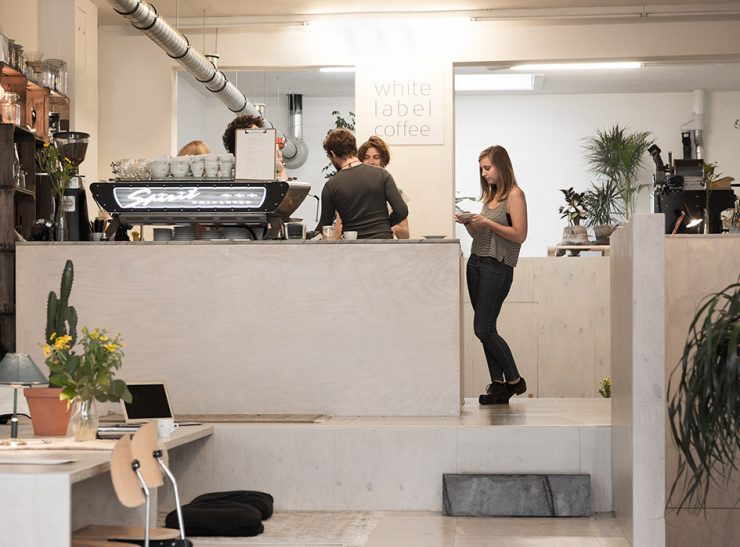
The archetypical Dutchman, it’s been said, is a melding of the merchant and the minister. On the one hand, he is a trader, eager to navigate other lands and languages, intercontinentally exchanging ideas and booty that enrich his small country. On the other, he is a morals master, led by a conscience long disciplined by Calvinist doctrine and postdiluvian community-mindedness.
That blend of economic savvy and humanism is surely part of White Label Coffee’s success. In March, the Amsterdam cafe and roaster took gold and bronze medals at the Dutch AeroPress Championship. And since opening just over a year ago, the business has become a wholesale supplier to a growing number of venues across Europe and, simultaneously, a place for residents of the city’s western borough to stop and smell the roasts.
White Label’s arrival is significant for Jan Evertsenstraat, a retail street overshadowed by storefront eaves and memories of a fatal jewelry store holdup in 2010. Darkness fades, though, when a visitor steps onto its premises, all light and lightness. The walls are white, the floor a blonde wood. Oriental rugs, whimsical artwork, and healthy houseplants invite customers to lay down their laptops and linger.
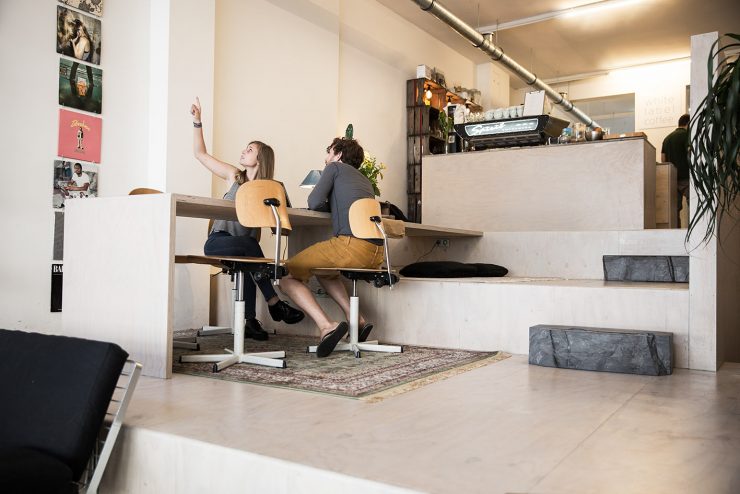
Co-owners Francesco Grassotti and Elmer Oomkens are welcoming, in a warm, laid-back way. Like effective salespeople and clergy both, they know well their product and their followers. It was not long after working together at Espressofabriek, Amsterdam’s pioneering cafe and roastery, that the pair decided to pursue a joint venture.
“We immediately wanted to be a roaster as well,” Grassotti says, explaining why a cafe alone was not enough. “To be more in control.”
Oomkens says both men are drawn to experimentation, crediting their scientific academic backgrounds (his: forensics; his partner’s: physics). “You can [experiment] of course through brewing, but if you also do that through roasting, you have a much broader, much bigger effect.”
On any given day, White Label has six or seven coffees on offer. Ethiopian coffees, washed and unwashed, and Brazilian coffees are fixtures. The remaining selection changes every few months, depending on what strikes their senses. “Send a sample, we’ll test it and we’ll let you know,” is their standard reply to the steady stream of solicitations.
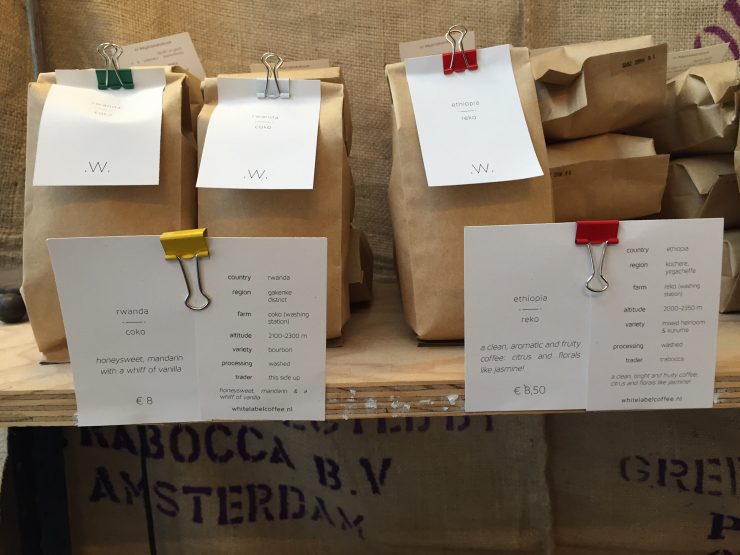
Grassotti’s current favorite is a coffee from Rwanda, the provenance of which he got to see last month on the pair’s first origin trip. For coordinating the journey, they tip their hats to This Side Up, a roaster-farmer liaison company run by Lennart Clerkx, whose transparent pricing and light-touch logistical support, they say, makes the trade “very close to being direct.”
The duo describes the local roasting culture as a healthy ecosystem, free of rivalries. “If we can help each other, we do,” says Oomkens. “There are so many places to supply, everyone can still take their pick…Everyone wants this kind of coffee to grow, so it’s more a shared goal that you have than that you’re trying to get each other’s customers.”
He recounts how cafe and roaster Headfirst, a 10-minute bike ride east, came to the rescue the weekend before when, while setting up at a market, they realized their rental machine was missing a piece. A phone call went something like this:
[Ring, ring]White Label: Do you have this part lying around?
Headfirst: Yeah, no problem, come pick it up.
Asked how Espressofabriek took their resignation, Grassotti recalls: “They were super sad,” though quickly adds that nobody harbored bitterness. “In the first two or three months [after opening], we didn’t have a roaster ourselves, so we roasted at their place.”
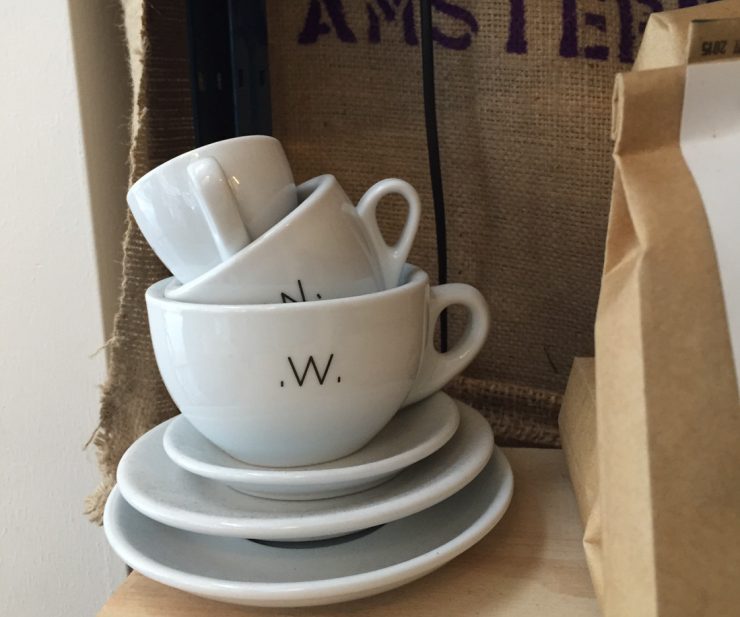
The pair have a reputation for spreading knowledge, too. When about a year ago, a fellow Amsterdam entrepreneur asked them to teach him all they knew about starting up a beverage-related business, they obliged. Later this month is the scheduled debut of Siebrand van Hengel’s record-shop coffee-bar hybrid, Black Gold.
White Label’s property is longer than it is wide, creating a sort of geometrically dramatic effect. The rectangularity is heightened by a multi-level floor, ascending in hanging-gardens-of-Babylon-style tiers. At its apex is the bar. Atop that are a Kees van der Westen Spirit, two Mazzer Kony grinders, a Mahlkönig EK 43 grinder, and a spread of homemade baked goods. Clients looked very comfortable on a recent afternoon, sitting and drinking cozied up to the Giesen W6 roaster, a Probat sample roaster, and plenty of burlap.
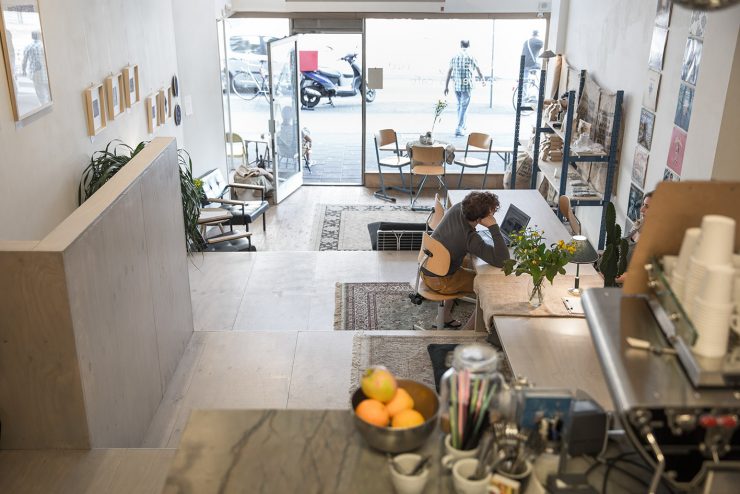
Behind the bar, the room’s tiers reverse, descending onto a smaller area for roasting and packaging. But that space is all-access, providing a few more seating opportunities in a venue whose capacity Grassotti guesses is 28. “It’s infinite,” Oomkens laughs.
White Label is located at Jan Evertsenstraat 136, Amsterdam.
Karina Hof is a freelance journalist based in Amsterdam. Read more Karina Hof on Sprudge.
The post White Label Coffee Looks Awesome, Is In Amsterdam appeared first on Sprudge.

